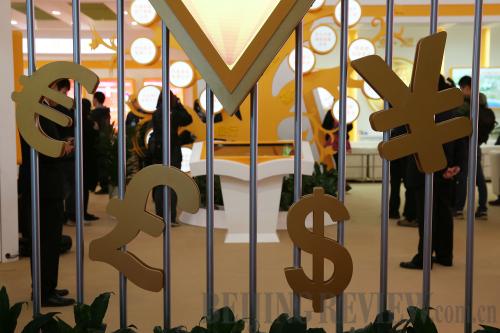|
 |
|
FLOATING CURRENCY: Pictured is the exhibition hall of the Ninth Beijing International Finance Expo held from October 31 to November 3, 2013 (CFP) |
"Our exports last year were 4 percent higher than those in 2012, but we didn't make much money," Li Haifu, owner of Beijing Haifu Trading Co. Ltd., told Beijing Review.
Sitting in Dahongmen area, Haifu is mainly engaged in the production of curtains and beddings, with most of its products being exported. According to Li, for exported products, the U.S. dollar is used at all stages from ordering to settling, and it takes four months for the company to collect the payment for goods. Owing to fierce competition in the textile market, the prices charged cannot be too high. When making quotations, Li's company aims to earn only a small profit, but when collecting money, they have found that because of the yuan's appreciation and price hikes in raw materials, the profits were much lower than they had anticipated when receiving orders.
"Last year we exported two batches of products, with one batch only covering the costs but making no profits," Li said. However, to maintain his business, he has to receive orders even if profits are nonexistent.
Substantial appreciation of the renminbi has dampened the competitiveness of Chinese export-oriented companies. According to figures released by the Bank for International Settlements on January 15, the effective exchange rate of the renminbi rose 7.89 percent throughout 2013. That is to say, if a company received an order of export at the beginning of the year and collected money at the year's end, they would lose 7.89 percent of the profits owing exclusively to exchange rates.
Zhang Monan, an associate researcher with the State Information Center, said exchange-rate liberalization is an important step on the road to the renminbi's internationalization. However, this stage progressed too rapidly in 2013. Over the year, the renminbi exchange rate against the U.S. dollar hit record highs 41 times, which was unprecedented since China initiated the exchange rate reform in 2005.
Zhang thinks the renminbi will continue to appreciate in 2014 for two reasons. Firstly, the continual liquidity expansion of offshore renminbi will further increase the yuan's appreciation. Secondly, the tightened money supply within China's financial system since last year will cause earning-rates differences between Chinese and U.S. treasury bonds to continue expanding, which will also help push the renminbi to appreciate.
That means in 2014, Li and bosses of other export-oriented companies will continue to suffer from the pressure brought about by the renminbi's appreciation.
Unilateral appreciation
The renminbi's appreciation is easy to understand against the backdrop of the quantitative easing policy introduced by the U.S. Federal Reserve (Fed). But after the Fed announced it would begin a drawdown of quantitative easing in December last year, it is hard to say if a stronger yuan will bring joy or sorrow to the Chinese economy.
One of the goals for China's exchange rate reform was to ensure that the renminbi was no longer pegged to the U.S. dollar but instead to a basket of currencies. Viewing the current situation, this goal seems to have been reached: In 2013, the renminbi exchange rate did not fluctuate because of changes in U.S. dollar supplies or fluctuations of the U.S. dollar's exchange rate against those of other currencies. Overall, the U.S. dollar seems to be imposing a reduced influence on the renminbi exchange rate.
A commonly accepted opinion among industrial insiders is that the growing demand for renminbi in the international market and the improving Chinese economy are the main reasons for the renminbi's appreciation.
According to a report released on January 23 by the Society for Worldwide Interbank Financial Telecommunication (SWIFT), in both November and December of 2013, the Chinese currency was one of the top 10 most-used currencies for payments in terms of value. In December 2013, the yuan's market share was 1.12 percent, ranking eighth, while in January 2012, its market share only ranked 20th at 0.25 percent.
"The fact that between November and December 2013, other currencies grew 7 percent whilst the renminbi grew 15 percent, however, might suggest that use of the Chinese currency is becoming business as usual for the world's financial institutions and corporations," said Franck de Praetere, head of Payments and Trade Markets, Asia Pacific, at SWIFT.
| 